 MyDogBreeds
MyDogBreeds Mal-Shi is originated from United States but Siberian Husky is originated from Russia. Mal-Shi may grow 30 cm / 11 inches shorter than Siberian Husky. Mal-Shi may weigh 20 kg / 44 pounds lesser than Siberian Husky. Both Mal-Shi and Siberian Husky has almost same life span. Mal-Shi may have less litter size than Siberian Husky. Both Mal-Shi and Siberian Husky requires Moderate maintenance.
Mal-Shi is originated from United States but Siberian Husky is originated from Russia. Mal-Shi may grow 30 cm / 11 inches shorter than Siberian Husky. Mal-Shi may weigh 20 kg / 44 pounds lesser than Siberian Husky. Both Mal-Shi and Siberian Husky has almost same life span. Mal-Shi may have less litter size than Siberian Husky. Both Mal-Shi and Siberian Husky requires Moderate maintenance.
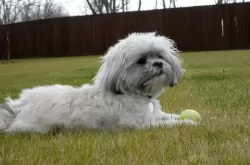 Small and pretty, the Mal-shi is a new crossbreed dog which originated in the United States and only recently - in the 1990s.
Small and pretty, the Mal-shi is a new crossbreed dog which originated in the United States and only recently - in the 1990s.
There hasn’t been much interest shown in developing this small dog into an independent breed, so most of these dogs are regarded as crosses from the two parent breeds – the Maltese Poodle and the ShihTzu.
Known as a designer dog he was also bred to be a low shedder. No breed clubs for this dog have been established and there are no breed standards either.
 Siberian Huskies are very close to Chukchi people.Chukchi is a tribe in Siberian nomads and huskies are beleived to be originated with them. DNA tests on huskies prove that they are the oldest among the dog breeds and they used them to travel fast. Also children used to sleep with them as they provide body heat to them. Siberian Huskies also like to be very close to the children. In 1908 at the gold rush, huskies were imported to Alaska and used as sled dogs. In Alaska they were used for dog sled race until today.
Siberian Huskies are very close to Chukchi people.Chukchi is a tribe in Siberian nomads and huskies are beleived to be originated with them. DNA tests on huskies prove that they are the oldest among the dog breeds and they used them to travel fast. Also children used to sleep with them as they provide body heat to them. Siberian Huskies also like to be very close to the children. In 1908 at the gold rush, huskies were imported to Alaska and used as sled dogs. In Alaska they were used for dog sled race until today.
Siberian Huskies were exported from Siberia and they continued their journey in North America. American kennel club recognized them in 1930 and the Siberian club of america has been founded in 1938.
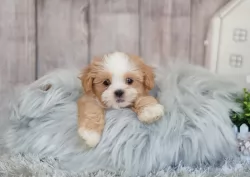 The Mal-Shi is a small dog standing at around 25–30 cm in height and weighing between 3 and 7kg. As a designer dog he has a low-shedding coat of many colors – white, black and white, white and apricot and brown.
The Mal-Shi is a small dog standing at around 25–30 cm in height and weighing between 3 and 7kg. As a designer dog he has a low-shedding coat of many colors – white, black and white, white and apricot and brown.
The coat is usually soft and silky and slightly wavy and it can grow long if left untrimmed. Most people take their pets to a professional groomer to be cut.
The skull of the dog is domed, he has small ears which can be half-erect and half-floppy.The tail is long and fairly feathery. Sometimes the dog inherits the underdeveloped tear duct of the Maltese and then there is that usual tear-staining around the eyes.
THE Mal-Si is such a cute little dog, making him a splendid pet for children and he is more than happy to be cuddled and petted. Small and active, he is adaptable and will live easily in the city or the countryside, as his exercise needs aren’t that demanding. He basically requires a walk each day and will love some ball games both inside and outdoors.
He is an extrovert and also an entertainer, and his amicable nature allows him to get along with other pets in the home. However, contrary to what he looks like, he is a bold dog, social and also intelligent, making him easy to train.
It is to any owner’s advantage to have a little dog like this trained and socialized, even though he is so good natured. He makes a great therapy dog too. When the Mal-Shi is at home he’s an affectionate, loving dog who just wants to spend time in the company of his human family.
As a companion dog, he won’t do well when left for hours on end on his own. Dogs are social creatures, and they can battle with separation anxiety when left alone for too long. Every dog owner needs to think of this before investing in a dog.
 Siberian Huskies are said to be one of the beautiful dog breeds in the world. They are well known for their thick coat and blue coloured eyes. Siberian Huskies are really challenging for new dog owners. It is preferred to give them a fenced yard and the fence should be sunk well to the ground to prevent them from escaping, as they always try to escape. They are medium sized working dogs having high energy level. Initially huskies were developed as sled dogs.
Siberian Huskies are said to be one of the beautiful dog breeds in the world. They are well known for their thick coat and blue coloured eyes. Siberian Huskies are really challenging for new dog owners. It is preferred to give them a fenced yard and the fence should be sunk well to the ground to prevent them from escaping, as they always try to escape. They are medium sized working dogs having high energy level. Initially huskies were developed as sled dogs.
They are affectionate and intelligent breed. Also they are independent in nature. They are kid friendly dogs and also are friendly with everyone including strangers. Siberian Huskies will be a good companion when given proper training and care. They are low shedders but it depends on the climate it lives. Normally they dont shed in cold climate but in warmer climate they will do. They shed heavily twice in a year for a three week strech. Normally Siberian Huskies do not suit well for apartment living. They are not watchdogs as they will bark very rarely but it enjoys to howl.
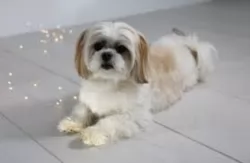 The Maltese Shih Tzu is an attractive little dog who is guaranteed to make you a splendid pet. Those who have owned both Maltese and Maltese Shih Tzu will tell you that the temperament of this dog is more amicable than that of the Maltese.
The Maltese Shih Tzu is an attractive little dog who is guaranteed to make you a splendid pet. Those who have owned both Maltese and Maltese Shih Tzu will tell you that the temperament of this dog is more amicable than that of the Maltese.
With his amicable nature, he is willing to be everyone’s friend, and he makes a particularly good choice for elderly people.
Being such a people-dog, the Maltese Shih Tzu's greatest joy comes from being petted and taken notice of by his human family. He can’t bear to be left for long periods of time. Like any other dog, he will require training and socialization, requiring a firm, balanced, consistent, fair owner.
Cheerful and good-natured, when he is loved to the moon and back, this little dog promises to make you and exceptional best friend.
 Siberian Huskies are very much affectionate with children. But it is necessary to train both parties to behave with each other. It is recommended to have an adult supervision for younger children.
Siberian Huskies are very much affectionate with children. But it is necessary to train both parties to behave with each other. It is recommended to have an adult supervision for younger children.
They are very good diggers and so they should be watched if they are in garden. They tolerate well in cold weather and mostly huskies can be seen in the area of snow falling. They are very good in pulling sledges.
They adapt well in cold weather. It is advised to give them a well fenced yard. They do not like apartment living. Also they do not like to be alone and if kept alone for long time they will disturb your house and make it dirty.
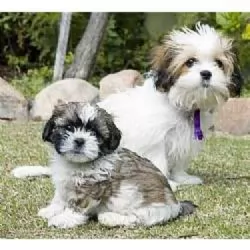 The Maltese Shih Tzu is a robust little dog, and with good care he can live to be anything between 10 to 15 years of age.
The Maltese Shih Tzu is a robust little dog, and with good care he can live to be anything between 10 to 15 years of age.
There are some health issues you want to be aware of with this particular dog breed.
Your little canine friend can have respiratory problems because of him being a flat-faced breed. Known as brachycephalic dogs, these dogs can have breathing difficulties. They are usually fine when resting, but during exercise or if they become too hot, they battle with breathing. It makes them more prone to heatstroke, so it is important to keep dogs like this cool and calm.
This is actually a common problem in small dogs - dislocation of a bone at a joint. Patellar luxation is when the knee joint slides in and out of place, causing pain.
This is a disease which is seen in the Shih Tzu and Maltese. Symptoms include uncontrollable shaking and tremors. These can continue all day. The illness is worse during times of stress and there may even be difficulty with walking. The cause is unknown but he will certainly need to get to the vet.
 Siberian husky suffers with minor health problems such as hypothyroidism, Progressive retinal atrophy and cataract. They are also prone to lose pigment in nose and muzzle. Some health problems occur due to bad breeding practices and some due to environmental problems where the puppy is brought up. They have also chances to get skin disease such as allergies.
Siberian husky suffers with minor health problems such as hypothyroidism, Progressive retinal atrophy and cataract. They are also prone to lose pigment in nose and muzzle. Some health problems occur due to bad breeding practices and some due to environmental problems where the puppy is brought up. They have also chances to get skin disease such as allergies.
When they are in the age of 2 to 5 years, they are having chances to hairloss due to Alopecia X. This condition mainly causes due to hair clipping in Siberians. They will be healthy but the hair will not grow in affected areas. Siberians are double coated and when the situation prevails the topcoat will fall off first and the undercoat follows it. The hair will fall off in both side of the dog in same area. Spaying or neutering will reduce such problems as it causes because of sex hormones.
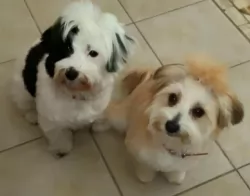 The Mal-Shi is a small dog and will require eating two small meals a day. An adult Mal-Shi will eat according to his age, size and activity levels.The quality of the dog food you buy will make a huge difference to his wellbeing. The better quality foods – those without preservatives, colorants and fillers will ensure good health and longevity for your pet.
The Mal-Shi is a small dog and will require eating two small meals a day. An adult Mal-Shi will eat according to his age, size and activity levels.The quality of the dog food you buy will make a huge difference to his wellbeing. The better quality foods – those without preservatives, colorants and fillers will ensure good health and longevity for your pet.
Don’t just give him dry kibble every time – mix in some chopped up cooked chicken, brown rice and vegetables. Remember that some vegetables like onion can be bad for your pet.
Dogs love simplicity, and feeding your dog these simple foods will ensure you don’t battle with upset stomachs. Make sure you always have a bowl of fresh, cool water available for your pet.
Trim his nails when they get long and don’t wear down naturally.
Check his ears for redness, itchiness and discharge which could indicate an ear infection.
If you have him professionally groomed, you will still need to brush him twice a week. It’s also your time to check him over for ticks and fleas and any unusual lumps.
 In one method of feeding the Husky puppies, the food will be given always available, but this method is not recommended as it has some problems. This method is followed by large breeders because of lack of time to spend on individuals. Another method is to keep meal for 3 times a day. At about 12 to 16 weeks of age the meals can be reduced to two times a day. In this method the meal given should not be there after 15 minutes even if puppy did not ate. The important training for Husky puppies while eating is they should not growl when the food is taken by its master.
In one method of feeding the Husky puppies, the food will be given always available, but this method is not recommended as it has some problems. This method is followed by large breeders because of lack of time to spend on individuals. Another method is to keep meal for 3 times a day. At about 12 to 16 weeks of age the meals can be reduced to two times a day. In this method the meal given should not be there after 15 minutes even if puppy did not ate. The important training for Husky puppies while eating is they should not growl when the food is taken by its master.
Many Siberian experts don't like commercial dog food as they are sure that because of such foods dog may get problems like itching, dandruff, loose stools and hot spots. According to experts the good food for them are home cooked food from turkey, real chicken, beef and fish. Fruits and fresh vegetables are also very good for them. It is advised by dog owners to add only low salt or even without salt in their food. Also sugar is not good for them as it will bring some problems like hairfall and itching.
Siberian huskies can be easily groomed. Their eyes should be checked in puppyhood as they get chances to get eye problems and hereditary eye diseases. It is advised to make siberians to bath once in a year and they must be brushed once in a week. While brushing, the ears should be inspected and its teeth should be brushed. It is good to trim the long hairs in their feet and also nails should be trimmed slightly and very carefully as they have blood vessels there.
To give training and exercises to Siberian Huskies, the home should be prepared for them and it is better to make a fenced yard to prevent escapes. They have very high chances to escape and so the fence should be minimum 6 feet high and base should be strong as it should not break it or dig under to escape. Since they are active from their puppyhood they must be given lots of exercise. They should be socialized in their early stages as to get good behaviour and manners.